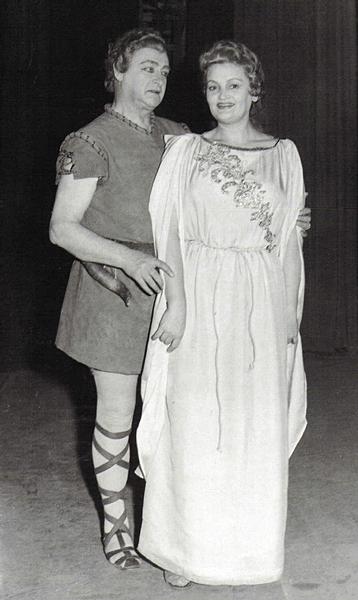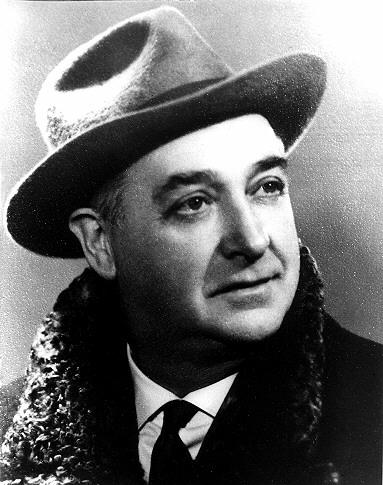Josip Gostič
Vatroslav Lisinski: PORIN – Frano Lovrić, Mirka Klarić, Dragutin Bernardić, Mira Štor, Zbor i orkestar Zagrebačke opere, Mladen Bašić JUGOTON, LPY-793 Wolfgang Amadeus Mozart: DIE ZAUBERFLÖTE – Hilde Güden, Wilma Lipp, Emmy Loose, Leopold Simoneau, Kurt Böhme, Walter Berry, Paul Schöffler, August Jaresch, Chor der Wiener Staatsoper, Wiener Philharmoniker, Karl Böhm DECCA-LXT 5085-5087 Jakov Gotovac: ERO S ONOGA SVIJETA – Drago Bernardić, Marijana Radev, Branka Oblak-Stilinović, Vladimir Ruždjak, Solisti, zbor i orkestar Hrvatskog narodnog kazališta u Zagrebu, Jakov Gotovac JUGOTON LPY-V-94-96 Richard Strauss: DIE LIEBE DER DANAE – Josef Traxel, Paul Schöffler, László Szemere, Annelies Kupper, Anny Felbermeyer, Dorothea Siebert, Esther Réthy, Georgine von Milinković, Sieglinde Wagner, Chor der Wiener Staatsoper, Wiener Philharmoniker, Clemens Krauss ORFEO D'OR C 292 923 JOSIP GOSTIČ – tenor (AIDA, FAUST, LOHENGRIN, PORIN, CARMEN, OTELLO, LA FANCIULLA DEL WEST, TURANDOT, TOSCA, ANDREA CHÉNIER, ERO S ONOGA SVIJETA, IL TROVATORE, BOSA POJDIVA, SAMO EN CVET, DA JO LJUBIM, AVE MARIA) ORFEJ HRT 30 (2 CD)
1. Chaikovskij: Evgenij Onegin (Lenskij) – Ljubljana, Narodno gledališče, 5 September 1929 2. Foerster: Gorenjski slavček/The nightingale of Gorenjska (Franjo) – Ljubljana, Narodno gledališče, 16 October 1929 3. Lortzing: Zar und Zimmermann (Peter Iwanow) – Ljubljana, Narodno gledališče, 23 October 1929 4. Puccini: La bohème (Rodolfo) – Ljubljana, Narodno gledališče, 15 February 1930 5. Bravnicar: Pohujšanje v dolini Šentflorjanski/ Scandal in Saint Florian Valley (Popotnik/Wayfarer) – Ljubljana, Narodno gledališče, 11 May 1930 6. Smetana: Prodaná nevěsta – Ljubljana, Narodno gledališče, 8 September 1930 7. Šafranek-Kavić: Hasanaginica/Hasan Aga's wife (Imotski kadija/The Cadi of Imotski) – Ljubljana, Narodno gledališče, 21 October 1930 8. Borodin: Knjaz Igor (Vladimir) – Ljubljana, Narodno gledališče, 25 October 1930 9. Musorgskij: Boris Godunov (Shuiskij) – Ljubljana, Narodno gledališče, 30 November 1930 10. Massenet: Werther (Werther) – Ljubljana, Narodno gledališče, 4 January 1931 11. Mozart: Così fan tutte (Fernando) – Ljubljana, Narodno gledališče, 22 January 1931 12. Charpentier: Louise (Julien) – Ljubljana, Narodno gledališče, 5 March 1931 13. Musorgskij: Boris Godunov (Jurodivij/Simpleton) – Ljubljana, Narodno gledališče, 18 April 1931 14. Novák: Lucerna/The lantern (Zajíček) – Ljubljana, Narodno gledališče, 8 October 1931 15. Rimskij-Korsakov: Snegurochka – Ljubljana, Narodno gledališče, 3 November 1931 16. Zajc: Nikola Šubić-Zrinjski (Juranić) – Ljubljana, Narodno gledališče, 8 December 1931 17. Osterc: Medea (world premiere) (Jason) – Ljubljana,Narodno gledališče, 27 February 1932 18. Mascagni: Cavalleria rusticana (Turiddu) – Ljubljana, Narodno gledališče, 3 April 1932 19. Dvořák: Rusalka (Prince) – Ljubljana, Narodno gledališče, 3 May 1932 20. Auber: Fra Diavolo (Fra Diavolo) – Ljubljana, Narodno gledališče, 1 October 1932 21. Verdi: Rigoletto (Duca di Mantova) – Ljubljana, Narodno gledališče, 1 November 1932 22. Massenet: Manon (des Grieux) – Ljubljana, Narodno gledališče, 19 November 1932 23. Hatze: Adel in Mara/Adel and Mara (world premiere) (Adel) – Ljubljana, Narodno gledališče, 30 November 1932 24. Gotovac: Morana (Bojan) – Ljubljana, Narodno gledališče, 5 February 1933 25. Giordano: Andrea Chénier (Chénier)- Ljubljana, Narodno gledališče, 17 May 1933 26. Cherepnin: Ol-Ol (Nikolaj)- Ljubljana, Narodno gledališče, 19 October 1933 27. Verdi: La traviata (Alfredo) – Ljubljana, Narodno gledališče, 11 November 1933 28. Janáček: Její pastorkyňa (Laca) – Ljubljana, Narodno gledališče, 18 January 1934 29. Rossini: Guillaume Tell (Rodolphe) – Ljubljana, Narodno gledališče, 8 February 1934 30. Janáček: Kát'a Kabanová (Vanja) – Ljubljana, Narodno gledališče, 26 May 1934 31. Offenbach: Les contes d'Hoffmann (Hoffmann) – Ljubljana, Narodno gledališče, 27 October 1934 32. Zandonai: Francesca da Rimini (Paolo) – Ljubljana, Narodno gledališče, 14 March 1935 33. Koczalski: Zemruda (Princ) – Ljubljana, Narodno gledališče, 9 May 1935 34. Musorgskij: Khovanshchina (Andrej) – Ljubljana, Narodno gledališče, 11 May 1935 35. Gounod: Faust (Faust) – Ljubljana, Narodno gledališče, 19 June 1935 36. Rossini: La Cenerentola (Don Ramiro) – Ljubljana,Narodno gledališče, 12 October 1935 37. Puccini: Madama Butterfly (Pinkerton) – Ljubljana, Narodno gledališče, 17 October 1935 38. Strauss: Salome (Narraboth) – Ljubljana, Narodno gledališče, 21 December 1935 39. Shostakovich: Lady Macbeth Mtsenkogo uezda/Lady Macbeth of Mtsensk (Sergej) – Ljubljana, Narodno gledališče, 12 February 1936 40. Strauss: Der Rosenkavalier (Italian singer)- Ljubljana, Narodno gledališče, 25 March 1936 41. Donizetti: Lucia di Lammermoor (Edgardo) – Ljubljana, Narodno gledališče, 22 April 1936 42. Rossini: Il barbiere di Siviglia (Almaviva) – Ljubljana, Narodno gledališče, 11 June 1936 43. Verdi: Un ballo in maschera (Riccardo) – Ljubljana, Narodno gledališče, 18 October 1936 44. Respighi: La fiamma (Donello) – Ljubljana, Narodno gledališče, 21 April 1937 45. Vladigerov: Tsar Kalojan (Balduin) – Ljubljana, Narodno gledališče, 15 May 1937 46. Kienzl: Der Evangelimann (Matthias) – Ljubljana, Narodno gledališče, 2 October 1937 47. Wolf-Ferrari: I gioelli della Madonna (Gennaro) – Zagreb, Narodno kazalište, 18 December 1937 48. Puccini: Tosca (Cavaradossi) – Ljubljana, Narodno gledališče, 29 January 1938 49. Mozart: Don Giovanni (Don Ottavio) – Ljubljana, Narodno gledališče, 22 February 1938 50. Dvořák: Jakobin (Jiří) – Zagreb, Narodno kazalište, 19 March 1938 51. Wagner: Das Rheingold (Loge) – Zagreb, Narodno kazalište, 5 April 1938 52. Catalani: La Wally (Hagenbach) – Zagreb, Narodno kazalište, 25 June 1938 53. Odak: Dorica pleše/Dancing Dorica (Ivek) – Zagreb, Narodno kazalište, 4 September 1938 54. Ponchielli: La Gioconda (Enzo) – Zagreb, Narodno kazalište, 10 September 1938 55. Bizet: Carmen (Don José) – Zagreb, Narodno kazalište, 18 December 1938 56. Musorgskij: Boris Godunov (Grigorij) – Zagreb, Narodno kazalište, 30 December 1938 57. Chaikovskij: Pikovaja dama (German) – Zagreb, Narodno kazalište, 9 March 1939 58. Wagner: Parsifal (Parsifal) – Zagreb, Narodno kazalište, 7 April 1939 59. Verdi: Don Carlo (Don Carlo) – Zagreb, Narodno kazalište, 20 May 1939 60. Lisinski: Porin (Porin) – Zagreb, Narodno kazalište, 31 August 1939 61. Goldmark: Die Königin von Saba (Assad) – Ljubljana, Narodno gledališče, 30 September 1939 62. Bellini: Norma (Pollione) – Zagreb, Narodno kazalište, 21 October 1939 63. Zajc: Nikola Šubić-Zrinjski (Sokolović) – Zagreb, Narodno kazalište, 22 December 1939 64. Verdi: Aida (Radamès) – Zagreb, Hrvatsko narodno kazalište, 5 April 1940 65. Puccini: Manon Lescaut (des Grieux) – Zagreb, Hrvatsko narodno kazalište, 4 April 1941 66. Gotovac: Ero s onoga svijeta (Ero) – Zagreb, Hrvatsko drzavno kazalište, 22 June 1941 67. Leoncavallo: Pagliacci (Canio) – Wien, Volksoper. 15 March 1942 68. Papandopulo: Sunčanica/Sunflower girl (Vezir) – Zagreb, Hrvatsko drzavno kazalište, 13 June 1942 69. Cilea: Adriana Lecouvreur (Maurizio) – Zagreb, Narodno kazalište, 31 October 1942 70. Strauss: Ariadne auf Naxos (Bacchus) – Wien, Volksoper, 4 September 1943 71. Wagner: Lohengrin (Lohengrin) – Wien, Staatsoper, 11 January 1944 72. Wagner: Der fliegende Holländer (Erik) – Zagreb, Narodno kazalište, 28 November 1944 73. Lisinski: Ljubav i zloba (Vukosav) – Zagreb, Narodno kazalište, 4 April 1946 74. Gotovac: Kamenik/The quarry (world premiere) (Nenad) – Zagreb, Narodno kazalište, 17 December 1946 75. Beethoven: Fidelio (Florestan) – Zagreb, Narodno kazalište, 22 February 1947 76. Glinka: Zhizn za tsarja (Sobinin) – Zagreb, Narodno kazalište, 6 February 1949 77. Verdi: Otello (Otello) – Zagreb, Narodno kazalište, 10 September 1950 78. Gotovac: Mila Gojsalića (Petar Kulišić) – Zagreb, Narodno kazalište, 18 May 1952 79. Strauss: Die Liebe der Danae (world premiere) (Midas) – Salzburg, Altes Festspielhaus, 14 August 1952 80. Mozart: Die Zauberflöte (Erster Geharnischter) – Wien, Staatsoper, 1 September 1952 81. Puccini: La fanciulla del West (Dick Johnson) – Wien, Staatsoper, 29 October 1952 82. Menotti: The saint of the Bleecker Street (Michele) – Wien, Volksoper, 16 September 1955 83. Wagner: Götterdämmerung (Siegfried) – Venice, La Fenice, 16 March 1957 84. Rimskij-Korsakov: Sadko (Sadko) – Zagreb, Narodno kazalište, 30 April 1957 85. Prokofiev: Vojna i mir/War and peace (Pierre Bezukhov) – Zagreb, Narodno kazalište, 20 November 1961 I wish to thank Alessandro Sciocchetti for the recording (Porin). I wish to thank Martin Ramor for the biographical notes, the picture, the discography and the Aida recording. I wish to thank Martin Ramor for extracting the repertory from Marija Barbieri et al.: Josip Gostič, Kulturno drustvo Josip Gostič, Homec, 2000 I wish to thank Daniele Godor for the picture in Götterdämmerung. |

